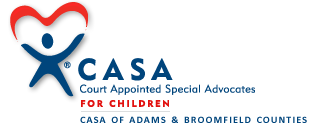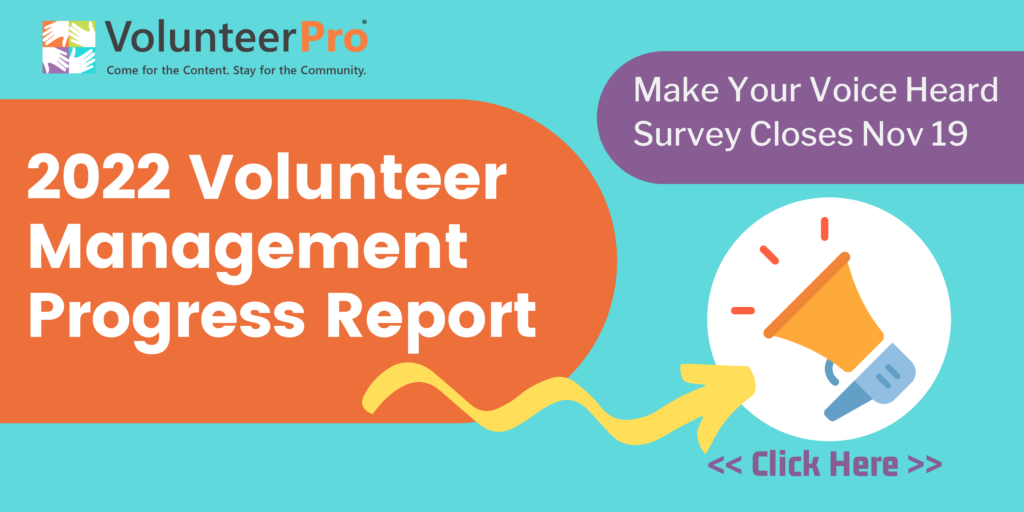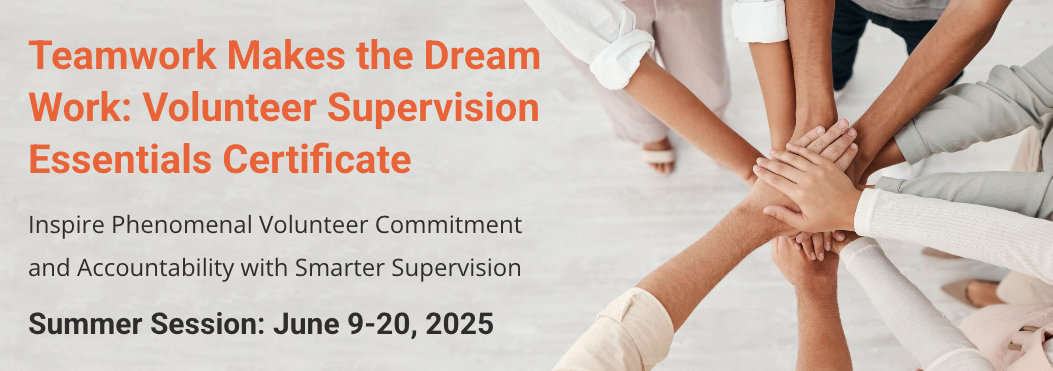Member Spotlight: How One Member Empowered Herself to Learn and Grow Alongside Her Volunteer Program
Welcome back to another member spotlight, where we feature some of the ups and the downs and everything in between of what it’s really like to work as a leader of volunteers. Follow along to learn how empowered volunteer leadership skills can have a direct impact on your volunteer program!
Follow along and learn how our members are taking action and getting traction with their volunteer management strategies!
This month, I had the pleasure of speaking with a conversation with Mara Buchmann, Data & Volunteer Manager for CASA of Adams and Broomfield.
Valerie: Thank you for joining me today, Mara! I am excited to hear about the transformation you’ve been able to witness within your volunteer program. Can you start by telling us a little bit about your organization and how you work with volunteers?
Mara: Yes, definitely. I work for CASA of Adams and Broomfield counties in the Denver Metro area. and CASA stands for Court Appointed Special Advocate. CASA was first thought up by a judge in Seattle back in 1976, who wanted advocates for children in his courtroom to help inform him as to what would be in their best interest and to give them the best life and the best hope for permanency in their life.
Since then, it was so successful and had so much interest from wonderful, loving people in the community, wanting to step up and be there for these families and these kids. It started growing program to program to program.
We are advocates. We take trained community individuals and we provide them with the knowledge that they need in order to go into the courtroom and advocate for these kids in these dependency and neglect cases. They provide knowledge to the judge in what they believe is in their best interest.
My job specifically is the Volunteer and Data Manager. We have staff members that directly supervise these volunteers. And I work really closely with those staff members and help them organize the volunteers, among many other things like working with our online database.
I’m also a volunteer as well. I have two cases myself within our CASA organization.
Valerie: Wow, that’s wonderful. It must be a rewarding experience.
Mara: Oh, definitely. I started out as a volunteer and fell in love with the organization.
I was a volunteer with CASA of Lancaster County in Nebraska when I was going to law school and then fell in love with the program and with the organization and knew I wanted to maintain my role as a CASA advocate, but also dedicate my career to helping others.
Valerie: It’s like a full circle moment!
Mara: A lot of us started out as volunteers and knew we wanted to make a career out of it. And I imagine that’s pretty similar at a lot of nonprofits.
Valerie: It seems like you have to have a certain mindset to get into this kind of work. Especially because know how difficult it can be to see children in the kind of situations too. It can be emotionally challenging on people who might not have the training to be able to respond appropriately.
Mara: You do have to constantly check in with yourself when it comes to self-care and how you’re handling all of this information and recognizing that it does have an effect on you.
Valerie: Absolutely. So how many volunteers do you engage in the space of one year?
Mara: Engage is a very broad term! We have our advocates specifically and they are volunteers from the community.
They’re volunteering their time, but it’s a really big role. They fulfill our mission for us, not just assist us in fulfilling our mission. They advocate for those children, but we also utilize volunteers in so many ways.
We have volunteers that help us out at our fundraising events and any other events that we do.
We also have some events that aren’t money raisers, but like our Christmas party that we do for the kiddos and things like that. And many of our supporters volunteer to help out with that.
So with that broad term of engaged, I’d say about 300 volunteers a year.
Mara’s Challenge: Defining Her Volunteer Management Role and Responsibility
Valerie: How did you hear about VolunteerPro? Were you facing some kind of challenge that drew you into membership or did you just kind of happen upon the website?
Mara: So first, a little bit about how CASA is structured. There is something called national CASA and it helps many of the programs throughout the country standardize help facilitate the programs, and fulfill their mission.
So, I actually received a grant through national CASA and was gifted this membership to VolunteerPro.
Valerie: Wonderful! We have a group of about 30 CASA members right now. Have you been able to connect with other CASA volunteer managers through the membership?
Mara: I have. I’ve been able to connect with the community, not just within CASA, but also volunteer managers in a broader sense.
I think sometimes we get tunnel vision about how we’re run a little different. And I think it’s really helpful to expand your volunteer management knowledge. There are so many seasoned, experienced people that do this and we could learn a lot from them.
Valerie: Now, when you started the membership through CASA, was there a particular challenge that you were facing?
Mara: My position isn’t exactly one that every organization has. So, part of it is figuring out who does what I do in other organizations. What is that title and how are the responsibilities divvied up?
Also, in my position, I have the luxury and the benefit of working for an organization, for an executive director, and a program director, and a board of directors that very much value program improvement and all of these things that are actually quite necessary, but not always necessary when it comes to day to day function of the program.
All of our staff members are fantastic and they have a great relationship with our volunteers, but we’d like to start capturing how well we capture data to inform us how well we are retaining these folks and how are we treating them and how do they feel about that?
So that’s what I’ve been envisioning for that– on top of, you know, just the day-to-day duties.
Valerie: It’s so good to hear you say you have the support of your leadership and colleagues. It will make everything you are trying to do easier for you!
How did it make you feel, knowing what you needed to get done, but not necessarily knowing how to get there?
Mara: I became a member right at the beginning of the pandemic, so it’s hard to disentangle what’s pandemic newness and how I’ve been experiencing work life and, and volunteer management because
of the pandemic and being shut down.
So, some of the stress and some of the hurdles that I’ve been overcoming have been due to just being remote and trying to figure out how to do this work. How to appreciate volunteers, keep them engaged, keep our organization going, but also continuing that program improvement throughout all of this.
Mara’s Objective: Improving Her Volunteer Management Skills
Valerie: Even though you joined the membership as part of a group, did you individually have a goal or an objective?
Mara: My background is not in volunteer management. I went to law school and I worked in a small firm and then did some solo practitioner work in criminal family law.
And I did some guardian ad litem work as well, which is what I wanted to go to school for, because I knew I wanted to be an advocate for children in this area. And when I found CASA it just clicked because I didn’t know what CASA was, but I always knew it was what I wanted to do.
So, it was weirdly perfect. Yet my experience is so much more programmatic and based in the courtroom. When I came to work for CASA and I had been a CASA advocate before so I had that knowledge, but I didn’t necessarily have the volunteer management knowledge. I didn’t have a background in nonprofits.
I didn’t have a background in working with volunteers, which at first it seemed how different can that be from managing a team of people? How different can that be from having a law clerk or an assistant? It is so different.
Of course, people are people but it’s a different type of work. And it deserves a different type of respect and different types of knowledge. So that’s where I really thought I could learn and improve on.
Mara’s Results: Empowered Volunteer Leadership
Valerie: Now that you understand everything that goes into volunteer management, what’s changed for you or your organization’s volunteer program?
Mara: Well for this past year, as you know, we’ve been adapting to a new way of life and being at home more often and social distancing. While we’ve been treading water with that, I really had the opportunity to get in a lot of continued education and absorb a lot of knowledge.
Also, we’re in the process of creating a really wonderful manual. It’s not just for internal use, but something that can be seen and used by stakeholders and can be used internally. It’s a representation of how we recognize and appreciate everyone that has a connection to CASA. So, any stakeholder, any advocate, any volunteer, any supporter, anyone that donates, we created a policy and procedure for that manual.
Also, it’s not even so much the specific information I’ve learned that’s been great. It’s been the overall sense of empowerment that comes from learning.
It’s more about the empowering perspective. It’s how you view this line of work and how important it can be. When you get that, you can bring it back to other staff members that work directly with volunteers. I think that’s one of the biggest changes, bringing back that piece of empowerment. And that perspective that this is a niche (Managing volunteers) and we can really hone our skills and be specialists in this area.
Valerie: This is so good, I love that! Anything else you want to share?
Mara: It’s not just about the tangible things I’ve done, like creating the manual. It’s about the process. We are utilizing it to bridge a connection between the two parts of our organization, the programmatic side and those that work on the development, events, and fundraising side.
What Mara Wants You to Know
Valerie: What would you say to somebody who is new to volunteer management and facing similar challenges?
Mara: The cliche that I’ve been using for myself is you don’t know, what you don’t know. And being committed to learning can bring a lot to the surface when it comes to knowing how to engage, retain, recognize, and appreciate volunteers. There’s just so much knowledge!
If nothing else, I would encourage people to dive in to learning volunteer management so they can have that same empowered perspective that it’s given to me. And I hope to pay it forward to our team.
Leaders like you have exhibited phenomenal spirit and dedication in 2021. And we want to ensure that your voices and experiences are heard.
In this survey we will explore the impacts of COVID on both you and your organization over the past year. We appreciation your participation.
Your answers will be anonymous and the survey takes LESS THAN 5 MINUTES to complete. At the end of the survey, you will be able to register for a free Sneak Peek Webinar where we will share the early results exclusively with participants before the general public.










